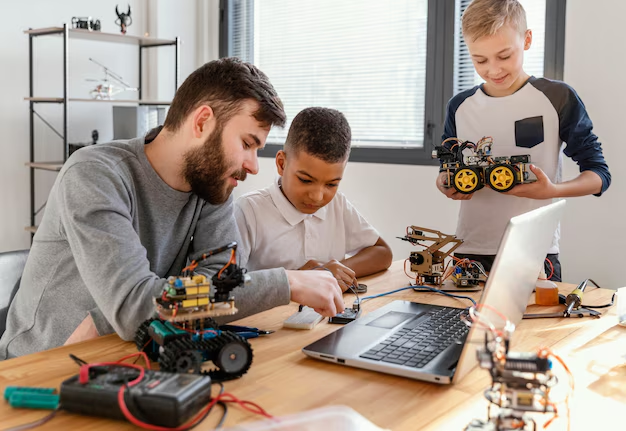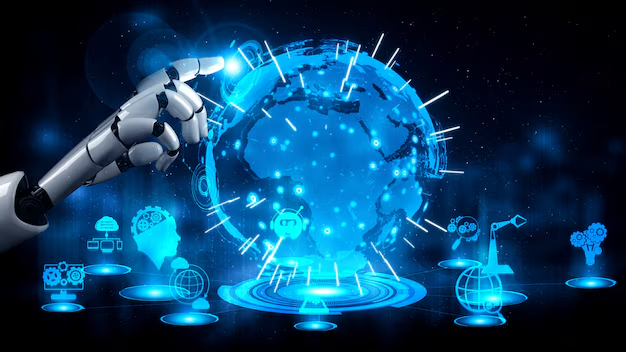The robotics revolution is here, and it is changing the world at an unprecedented pace. From advanced manufacturing processes to healthcare breakthroughs and everyday household tasks, robotics is transforming industries and improving lives. This article explores how machines, powered by cutting-edge technology like artificial intelligence (AI) and automation, are revolutionizing various sectors and shaping the future of human society.
1. Understanding Robotics: The Basics
What is Robotics?
Robotics is the branch of technology that deals with the design, construction, operation, and application of robots. These robots are programmable machines designed to perform tasks autonomously or with minimal human intervention. Robotics combines engineering, computer science, and artificial intelligence to create intelligent systems capable of handling complex tasks.
Types of Robots:
- Industrial Robots: Used in manufacturing for repetitive tasks like assembly, welding, and packaging.
- Service Robots: Designed to assist in customer service, healthcare, and hospitality.
- Autonomous Robots: Capable of making decisions and performing tasks without human input, such as self-driving cars and drones.
- Collaborative Robots (Cobots): Robots that work alongside humans to improve productivity and efficiency.
2. The Impact of Robotics on Industries
1. Manufacturing and Automation:
Robots have revolutionized manufacturing industries by automating repetitive and complex tasks. In factories, robotic arms assemble products, package goods, and even perform quality control checks. This automation leads to increased efficiency, higher output, and reduced human error.
Key Benefits in Manufacturing:
- Enhanced productivity
- Precision and accuracy
- Reduced labor costs
- Improved worker safety
2. Healthcare and Surgery:
In healthcare, robotics is making waves with surgical robots and robotic-assisted rehabilitation. Robots in surgery offer higher precision, smaller incisions, and faster recovery times. For patients with disabilities, advanced robotic prosthetics and exoskeletons allow for more natural movement and mobility.
Healthcare Advancements with Robotics:
- Minimally invasive surgeries
- Robotic-assisted diagnostic tools
- Advanced prosthetics and exoskeletons
- Increased patient recovery speed
3. Robotics in Everyday Life

1. Household Robotics:
Robots are no longer confined to industrial applications. Everyday consumers now have access to household robots like smart vacuums, lawnmowers, and even window-cleaning machines. These robots save time and effort, making day-to-day tasks easier and more convenient.
Examples of Household Robots:
- Robotic vacuum cleaners (e.g., Roomba)
- Robotic lawnmowers
- Robotic pool cleaners
2. Service Robots:
In the service sector, robots are increasingly used to improve customer experiences. From hospitality to retail, robots are taking on roles such as delivering food, greeting guests, and providing information. They enhance service efficiency and create a more personalized experience for customers.
Service Robots in Action:
- Automated check-in kiosks in hotels and airports
- Robots delivering food and beverages in restaurants
- Customer service robots in malls and shopping centers
4. Robotics in Agriculture: Revolutionizing Farming
1. Autonomous Farming Robots:
In agriculture, robotics is revolutionizing the way food is grown and harvested. Autonomous robots equipped with sensors and AI can plant crops, monitor growth, and even harvest fruits and vegetables. These innovations are making farming more efficient, reducing labor costs, and improving yields.
Robotic Technologies in Farming:
- Automated tractors and harvesters
- Drones for crop monitoring
- Precision irrigation systems
2. Reducing Environmental Impact:
Robotics also plays a role in sustainable farming. Robots can optimize resource usage, such as water and fertilizers, by providing precise amounts when and where they are needed, reducing waste and minimizing environmental damage.
5. The Future of Robotics: What’s Next?
1. Autonomous Vehicles:
One of the most talked-about applications of robotics is in autonomous vehicles (AVs). Self-driving cars and trucks powered by robotics and AI have the potential to transform transportation, reduce traffic accidents, and create more efficient logistics networks.
2. Robotics in Space Exploration:
Robots are already being used in space exploration to perform tasks that are too risky for humans, such as exploring other planets and repairing satellites. As space technology advances, robots will play an even more critical role in our ability to explore and colonize outer space.
3. AI and Robotics Integration:
As AI and machine learning continue to evolve, robots are becoming increasingly intelligent, capable of learning from experience and making decisions in real-time. This integration will lead to highly autonomous robots capable of performing more complex tasks across various sectors.
6. Challenges and Ethical Concerns
1. Job Displacement:
One of the biggest concerns with the rise of robotics is its impact on jobs. As robots take over tasks traditionally performed by humans, some fear widespread job displacement. However, others argue that robots will create new opportunities in fields like AI development, robotics maintenance, and tech innovation.
2. Ethical Issues:
As robots become more autonomous, questions arise about their role in society and their ethical implications. Issues like data privacy, accountability for robot actions, and the moral implications of robot decision-making are critical topics that need careful consideration.
Also Read : Revolutionizing The Future: The Impact Of Robotics On Industry And Society
7. Conclusion: Embracing the Future of Robotics
The robotics revolution is not just a passing trend but a transformative force that is changing the world as we know it. From industries and healthcare to daily life and space exploration, robotics is enhancing human capabilities and efficiency. While challenges remain, the potential benefits of robotics are undeniable, offering solutions to many of the world’s most pressing issues.
As we move into the future, embracing robotics and AI will enable us to tackle challenges in ways we never thought possible. The revolution has begun, and the world is already feeling its impact.
SEO Optimized Keywords:
- Robotics revolution
- How machines are changing the world
- Impact of robotics
- Robotics in manufacturing
- Robotics in healthcare
- Autonomous robots
- Industrial robots
- Robotics in everyday life
- Robotic automation
- Artificial intelligence and robotics
- Household robots
- Service robots
- Robotic technology advancements
- Future of robotics
- Autonomous vehicles
- Robotics in agriculture
- Robotics in space exploration
- Ethical issues in robotics
- AI and robotics integration
- Job displacement from robots
- Robotics in education
- Smart robots
- Robotics and job creation
- Robotics in research
- Future of AI-powered robots
- Robotic prosthetics

